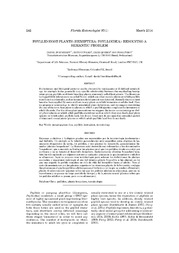Psyllid host-plants (Hemiptera: Psylloidea): resolving a semantic problem.
Psyllid host-plants (Hemiptera: Psylloidea): resolving a semantic problem.
Author(s): BURCKHARDT, D.; OUVRARD, D.; QUEIROZ, D. L. de; PERCY, D.
Summary: Evolutionary and biological patterns can be obscured by inadequate or ill-defined terminology. An example is the generally very specific relationship between the sap-feeding hemipteran group, psyllids, and their breeding plants, commonly called host-plants. The literature is clogged with references to so called ?hosts?, which are often merely plants on which psyllids were found accidentally, and no immature development was detected. Recently the term host has also been applied by some authors to any plant on which immature or adults feed. Here we propose a terminology to clarify associated plant definitions, and we suggest restricting the use of the term host-plant to plants on which a psyllid species completes its immature to adult life cycle. For the other plant associations we suggest the terms overwintering or shelter plant (plants on which adult psyllids overwinter and on which they may feed), food plant (plants on which adult psyllids feed, but do not breed and do not spend an extended period of time) and casual plant (plants on which adult psyllids land but do not feed).
Publication year: 2014
Types of publication: Journal article
Unit: Embrapa Forestry
Keywords: Host-plant, Jumping plant-lice, Planta Hospedeira, Psilídeo, Psyllids, Terminologia, terminology
Observation
Some of Embrapa's publications are published as ePub files. To read them, use or download one of the following free software options to your computer or mobile device. Android: Google Play Books; IOS: iBooks; Windows and Linux: Calibre.
Access other publications
Access the Agricultural Research Database (BDPA) to consult Embrapa's full library collection and records.
Visit Embrapa Bookstore to purchase books and other publications sold by Embrapa.

